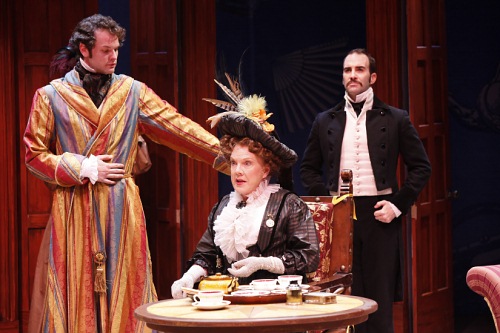I flew back to New York from Florida last weekend to review two shows for today’s The Wall Street Journal, one off Broadway (Ernest in Love) and one on (Present Laughter). One was perfect, the other good but greatly flawed. Here’s an excerpt.
* * *
 Most musicals are born to be big, but some take wing when staged on a small scale. A happy case in point is “Ernest in Love,” which is currently being presented with bewitching finesse Off Broadway by the Irish Repertory Theatre. The 1960 stage production of the musical-comedy version of “The Importance of Being Ernest” got great notices but ran for a paltry 103 performances, then vanished largely without trace, leaving behind only a cast album. The Irish Rep’s revival, the first of any significance ever to be mounted in New York, is so endearing that I can’t help but wonder why so delightful a show disappeared from sight for so long.
Most musicals are born to be big, but some take wing when staged on a small scale. A happy case in point is “Ernest in Love,” which is currently being presented with bewitching finesse Off Broadway by the Irish Repertory Theatre. The 1960 stage production of the musical-comedy version of “The Importance of Being Ernest” got great notices but ran for a paltry 103 performances, then vanished largely without trace, leaving behind only a cast album. The Irish Rep’s revival, the first of any significance ever to be mounted in New York, is so endearing that I can’t help but wonder why so delightful a show disappeared from sight for so long.
Does Oscar Wilde’s best play really need music? Of course not. But Anne Croswell (who wrote the book and lyrics) and Lee Pockriss (who wrote the music) managed between them to put a fresh and personal spin on “Earnest”: They shifted the emphasis from Wilde’s epigrams to his pretty-young-things-in-love plot, thereby turning a masterpiece of diamond-hard verbal ingenuity into a romantic soufflé lightly sauced with wit. No, it’s not Wilde, but if you can keep from breaking out in a cheek-to-cheek grin when Jack Worthing (who is played with sweetly boyish charm by Noah Racey) launches into a neat little soft shoe in the first scene, you’re just a sour old crock….
Charlotte Moore’s staging, which makes perfectly judged use of the Irish Rep’s L-shaped 140-seat theater, points up the show’s innate charm without once going over the top. The cast is adorable, especially Annika Boras, who plays Gwendolen as a sexy prig…
The revival of Noël Coward’s “Present Laughter” that opened on Broadway this week under the auspices of the Roundabout Theatre Company is the same one that I saw performed in Boston three years ago by the Huntington Theatre Company, give or take a couple of new cast members. I liked it with significant reservations in 2007, and I feel the same way now: It’s effective, but not the “Present Laughter” of my dreams.
The play, written in 1939 and last seen on Broadway 13 years ago, is one of Coward’s finest, a coruscating piece of autobiographical spoofery in which he sent himself up with unexpected honesty (Garry Essendine, Coward’s onstage alter ego, is a charismatic but by no means likable piece of fancy goods). In this production, directed with a too-broad brush by Nicholas Martin, Victor Garber is “doing” Coward himself rather than creating a character from scratch, and though his imitation of Coward’s speaking voice is eerily exact, he lacks the sleek physical glamour of his well-remembered model. Mr. Garber gets his laughs, but it’s hard to see why so many of the women in the play feel moved to fling themselves at his feet….
* * *
Read the whole thing here.
Archives for January 22, 2010
TT: The vexing texters
Last May, I found myself seated for the first time behind a philistine who sent a text message in the middle of a show that I was reviewing. She got off lucky–I wasn’t armed. Like most civilized folk, I take a hard line on texting during performances. But given the fast-increasing ubiquity of texting, I suspect that we’re on a slippery slope here, and so do a number of performing-arts organizations that are starting to experiment with organized texting during performances.
Texting has already been used to poll audiences and let them pick an encore, or choose between alternative endings for a play. Might this be a desirable step toward heightening an audience’s involvement in a performance? Or the thin end of a social wedge whose unintended consequences could be highly undesirable? I’ll attempt to sort out some possible answers to this tricky question in my “Sightings” column for Saturday’s Wall Street Journal. Pick up a copy of tomorrow’s paper and see what I have to say.
UPDATE: Read the whole thing here.
TT: Almanac
“The worst of doing one’s duty was that it apparently unfitted one for doing anything else.”
Edith Wharton, The Age of Innocence
